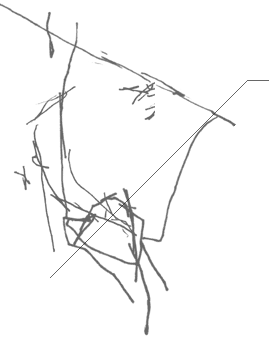Tuesday, March 3, 2026 |
||

|

by Michael Goldberg
Monday December 17, 2001
Sarah Dougher's Conflicted World
A singer/songwriter examines love's shadows.
|
|||
|
I like the sound of Sarah Dougher's voice. Listening to her sing, I can believe I'm listening to a real person. Reinforcing that impression is the fact that her three albums — Day One, The Walls Ablaze and her latest, The Bluff — were released by small indie labels. No one is trying to turn Ms. Dougher into some plastic superstar. She has the imperfect voice of a real singer — no studio trickery for this woman!
Another thing I like about her: she looks like a real person. In other words, she doesn't look like one of the ridiculous, unreal (surreal?) models in the ads that run in the New York Times Magazine each week. She just looks like a regular person, someone you might see at the coffee shop. Not that how someone looks should matter when we're talking about music, but it does. Just like album art does — if the cover is cool, I have higher hopes for the music inside. When Sarah Dougher sings, I believe her. I believe the tales of lovers who have left her, and lovers she has left. What I get from Dougher is a feeling, a sense that this is a person using the medium of music to express her emotions and her ideas. One could say that she is "keeping it real," but these days I don't think that phrase means a whole lot. So I think she's sincere. In fact, I know she's sincere. You can hear it. Now the reason that matters is because Dougher is an artist with something meaningful to say. Sincerity in and of itself doesn't mean a whole lot if the art is lousy; Dougher's art makes you think and feel. At times, it stops you in your tracks. I went out and bought The Bluff after reading the review Greil Marcus wrote in the New York Times some weeks ago. I also bought her two earlier albums. Somewhere in my house, buried among many, many other CDs, I have one (maybe even both) of those albums, but I don't know where they are — and after reading Marcus' words, I needed to hear them. Right away. I couldn't risk not being able to find them. Relationships Falling Apart I've been listening to all three for the past two weeks. I'm not sure which album I like best. Certainly the title track of The Walls Ablaze is one of the best things Dougher has recorded. It begins with just a guitar riff — oh, but what a melody! So quiet, but so dark. Something about this song reminds me of Sleater-Kinney: the dynamics, the way Dougher sings softly at first, then bursts into the chorus. It's exciting and scary — the first time you hear it you don't know what's going to happen; all you know is you wanna find out. I hear a song about a relationship that may be over. The house — their love? — is burning. "Show me a sign of things that you can change or keep the same," she sings. That song is followed by "No-Handed," with the lines "Lock the door behind me, I'll find my own way out/ No tears to dramatize it, nothing to cry about." You can hear in these songs and others a concept album about relationships falling apart. On the other hand there's something touching, perhaps slightly naïve, and very homegrown about Day One. (And I love the grin on her face that you can see on the cover.) The writing is denser; as she wrote more, Dougher learned to say as much or more with less. The Bluff, however, is probably the best performed of the three. It has the best playing and singing, and the writing is even stronger than on the other two. Contradiction And Confusion The Bluff is all about contradiction and confusion. "When you tell me all those lies, I know that they're not true," Dougher sings at the beginning of "Must Believe." Then she adds, "But when I hold you in my arms I must believe, I must believe/ That you won't do me any harm, I must believe, I must believe." Some of these songs are about love unfulfilled, such as the minor-key ballad "Turn Myself," which opens with the awesome lines "I turned myself to tinder and I waited there for you/ Beside the wide river, beside the wild wood/ Dry and unforgiving, the sap had ceased to run/ Cut in the green of summer and cured of every love...," and proceeds to its bitter end with line after line of the most beautiful, heartbreaking verse. Dougher makes a kind of folk-rock. She comes from the folk tradition (on Day One she works a few lines of the old standard "Stealin'" into the title track), but she's also a rocker, and rock arrangements and instrumentation flesh out her songs. It's all natural and unforced — the music and words fit seamlessly together, as one. Perhaps the most dramatic and, well, thrilling moments come during "The Homecoming," a song about a kind of betrayal and abandonment, which is the album's centerpiece. In this song, the heroine realizes that it's time to stop waiting, that what she's waiting for will never come — she must move on, escape from the hold of a love that is no longer reciprocated. This is the stuff of real life; it's one way of digging oneself out of a life that has ceased to matter. As Dougher begins to sing "I can't wait anymore for you...," her voice gets harder and the guitar rhythms turn aggressive, angry. She continues: "I'll take the first one to come through/ I can't wait anymore for you, I'll take the first one to come through." |
||||